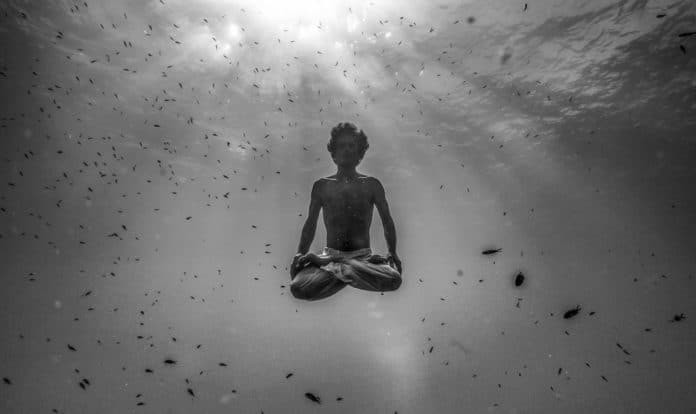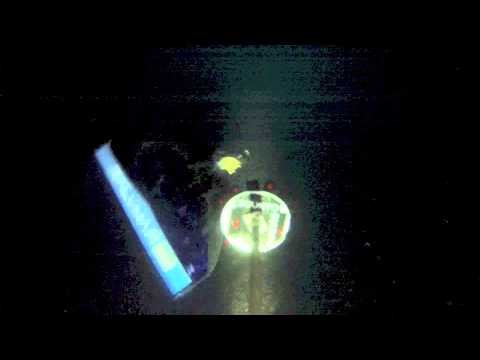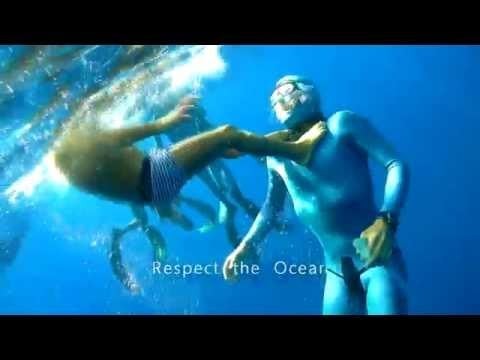While Davide Carrera may seem like the free-spirited Peter Pan of apnea, he has a career at the highest level of competitive freediving that spans over 20 years and shows no signs of slowing. He set his first world record in 2001, and his most recent one in 2016.
A unique athlete in his philosophy towards freediving, Carrera is someone who is both competitive but also driven by a deep search for balance and freedom. A practitioner of yoga since his early teens, Davide is profoundly connected to the meditative aspect of apnea, the sensations of being in the ocean, and the relationship of the mind, body, and emotions and the spirituality that he encounters in the water.
Born Turin, Italy in 1975, Davide spent his summers in Liguria with his grandparents, in the sea, and on the sea, snorkeling with his uncle from age of 5. He would swim in the pool in winter, and always loved swimming and sports.
As a teenager, influenced by his growing awareness of the world of freediving, his idol Umberto Pelizzari and other freediving legends such as Jacques Mayol, Enzo Maiorca, and Pipin Ferreras, he began to try diving deeper. He read about Pelizzari practicing yoga, so he began to train himself.
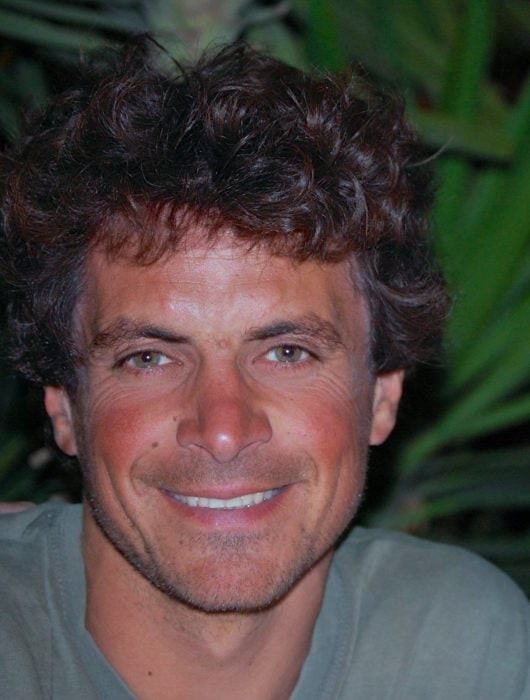
As an 18yr old, already going to 40m, Davide had a chance to meet Pelizzari in Elba, where he was training for his next record. As this time he would also meet Jacques Mayol, and then two years later he was asked by Umberto to come and work with his team as a safety diver. Davide claims that much of his respect for the sea, and his meditative approach to freediving, is due to Umberto’s influence.
In 1996, Davide’s first competition was as part of the winning Italian team at the championships in Nice. In 2001 he also formed part of the Italian team that won the world championships in Ibiza, and just a month later he had broken his first world record, with a dive to 91m in Free Immersion (FIM), taking the record from Czech freediver Martin Stepanek who had set the record at 90m two months earlier.
In 2004 Davide decided to take a break from competition, just three years after breaking the first world record, feeling the stress of expectation and wanting to freedive just for himself. Already a skipper, he bought a trimaran, and sailed around the Mediterranean, living from spearfishing. While he doesn’t spearfish now, he is still considered by many to have been one of the best spear-fishermen in the world.
Four years on, Carrera began to miss the emotion of competition. To note just some of his many achievements since returning to competition in 2008: he broke the Italian national record in constant weight (CWT) with a dive to 99m in the Vertical Blue competition in 2009 in the Bahamas; in 2014 and 2016 he broke the CMAS world records in constant weight with dives to 94m and 111m respectively; in 2017 he broke the Italian national records in CWT and CNF (constant no fins) with dives to 114m and 75m, also at the Vertical Blue competition. At the time of writing, his personal best in constant weight is 116m.
Davide has been involved in several films and television productions including Momentum, and Don’t Crack Under Pressure, seasons 1, 2, and 3, from Nuit de la Glisse.
Currently based in Nerja, in Andalucía, Spain, Davide spoke to DeeperBlue.com to share a little part of his philosophy on life and freediving.
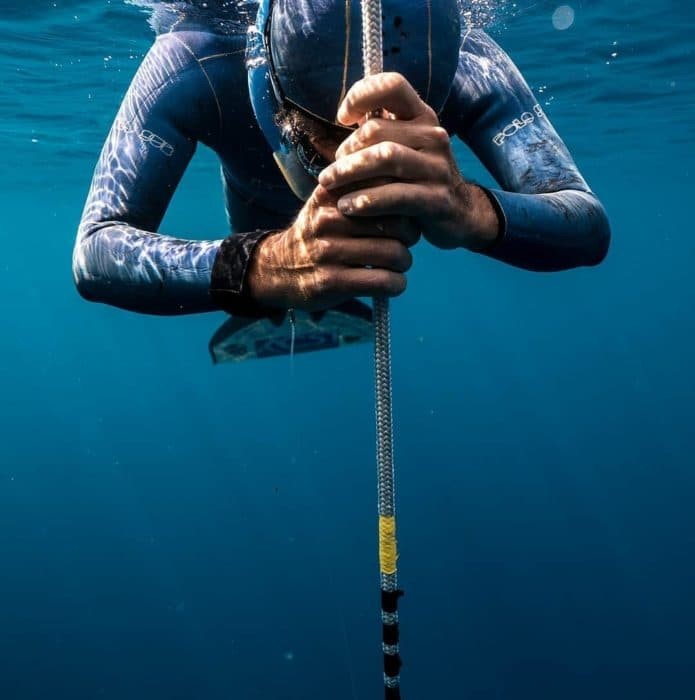
DeeperBlue.com: What continues to inspire your freediving?
Davide Carrera: To me, freediving has always been my yoga – from when I was a child – my way to know myself better. I love to freedive because it is an inner search.
DB: Who do you most admire in the freediving world?
DC: I admire many people. I think I learn something from everybody. As a teenager of course, my idol was Umberto Pelizzari, and I was lucky enough to spend a lot of time with him, so I had the opportunity to know him very well and to train together for very long periods. But I like to see that everybody can give something to the freediving world.
Also, some people whom I used to judge more, for example, William (Trubridge). I remember the first Vertical Blue I went to, I was saying to him “William you are pushing too much.” I was training a month and a half before with him, so I said to him, “this is not freediving”. I still don’t like to see people pushing too hard, but at the same time, William helped me to see the positive side of this part, as sometimes you have also to risk a bit also to learn about yourself.
Also, it is about the ego. The ego wants to keep control, and sometimes to accept that we can fail, or have a blackout, is also good for the ego, to slow down the ego. To accept we can fail is the biggest freedom.
I learned to respect this part of William. I respect William a lot as a freediver, as a friend, as a human being. Freediving makes you a better person because you have to work on yourself.
DB: What are your favorite place/s to freedive?
DC: I like the Mediterranean because I grew up in the Mediterranean. I like places like Sardinia or Greece, they’re amazing places. But also I love the warmth of tropical seas, like the Bahamas or Hawaii.
I would love to return to the south of Japan, there are some little islands called the Tokara islands, where I have some very nice memories.
Something I’ve really liked in my life is diving with humpback whales, and this happened to me in Hawaii and Tahiti, and this is something amazing. The movement and sounds are very special. It’s deeply healing. Just listening to this sound opens your heart and slows down your mind, it’s like listening to a mantra from a guru that takes you into a trance or deep meditation.
DB: Can you tell us about any exciting locations that you would you love to freedive?
DC: I prefer freediving in warmer water because I love diving without a wetsuit to feel the water on the body, but I’m curious about diving under an iceberg. I would like to see how that is. I dived in Norway with Orcas, but I never saw an iceberg.
There are many other places I would like to see in tropical seas, for example, to visit more places like the Galapagos or wild parts of Indonesia.
DB: What would be your best piece of training advice for beginner/intermediate freedivers?
DC: I think training is very personal, so there is not one key that works for everybody. I think that the best training for everybody is meditation, just because when you meditate, you become more aware of yourself and you can discover your weak part. The moment you can understand the weak part you can work on it. If you feel you need to strengthen your legs you go running up the mountain; if you feel you need to improve your aquaticity, you go swimming; if you feel you need to improve your elasticity, you do yoga. So, for everybody it is different. The most important thing is becoming aware, or having some trainer who can watch you and understand what it is you have to train. And then you train.
And of course, being in the water and enjoying the ocean is one of the best things to do.
Top freediving athletes favor a variety of cross-training methods. What is your preferred form of dry training and why?
Cross training is something interesting that you can do everywhere. Of course, if I can choose between the gym or a mountain, I prefer to go running in the mountain. I love nature, and I love to be in the open air. To me, training is also working on the land and in my kitchen garden. I’ve found myself also running up and down the stairs of a skyscraper because I was in Milan and I didn’t have time for the gym. I was running up the stairs, and doing some parts holding my breath.
DB: What is your pre-dive preference: breakfast or fasting?
DC: I always preferred to fast before freediving. But recently I think it is all about balance. I like something that Bruce Lee was saying: my rule is to have no rules. And he was saying: don’t think, feel. So I don’t want to give myself rules and a schedule, like, I know I have to eat 50g of this or that, 3 hours before freediving. What I try to do now, is to meditate and feel if I’m hungry, to allow myself to be free. Of course, I don’t eat, like, a kilo of something just before a dive… if so I would vomit! But if I need to eat something, then I do. Of course, being a little bit empty helps with breathing more properly, and for being more calm with your mind by finding the right balance.
DB: What general nutritional principles do you follow?
DC: So, it’s all about McDonald’s, donuts, Pringles and coca cola. [laughing] And whiskey of course!
No… I’m always exploring this side. When I have the opportunity, I like to grow my own food. I think the quality of the ingredients, the freshness, is very important. I like to eat vegetables, fruit, cereals. I’m not vegan. I’m not a vegetarian. I like to feel free. I’m not a big meat eater, since I was a child, even before going to India and meeting the vegetarian philosophy. But I’ve never been very interested in meat. But sometimes, when I train very hard, I feel like I want to eat some meat, so I try to find good meat. The best is when I’m in places when I know friends who are hunters and I can eat a piece of wild pork or a goat from the mountain. If not I like to go fishing. Sometimes I will have sashimi. It’s more that I meditate, and the desire for animals is low, and I spend more time eating vegetables, nuts, sprouted seeds and that kind of thing. I like eating raw food, making fresh juices with a slow juicer.
What we don’t think about enough, but is very important to me is the quality of the water we drink. We don’t think of it as a nutrient because it is zero calories, but water is the first nutrient, so to drink fresh spring water or to have a good ionizer or filter for the water can change the quality and the structure of the water. I don’t drink water from plastic bottles, or pollution but also because it’s been scientifically proven to be carcinogenic.
DB: Freediving is a teacher: what important life-lessons has freediving given you?
DC: I learned many different lessons. And mainly the lessons are hard. I’ve learned mainly when I’ve had troubles or accidents. I’ve had moments that I have risked my life, so at that moment you learn… when you see that you can lose something in life, you start to appreciate it more. So, of course, many people ask why I do an extreme sport, and people think we do it because we don’t love life, but it is the opposite. We do it to be able to appreciate and to love life more.
DB: Where do you see yourself in 5-10 years?
DC: In the last few months I haven’t been very active in competition, but I love to compete because it is always a stimulation to work on yourself and my dream is to do one world record in constant weight with a monofin. I know it’s very hard now because Alexey (Molchanov) goes very very deep! But I also think that freediving is about longevity. It’s like Kung Fu, you can have a master who is 70 or 80 years old, and they’re still very strong. And I’m older and still going very deep and still learning things about myself and keeping my body healthy, and practicing to be able to keep going deeper and deeper.
And also it would be to enjoy going deep freediving with my son if he wishes. He already loves freediving, so maybe when he is a little older we can go deep freediving together [Nero is 9 years old now].
DB: Can you describe your most memorable or significant dive?
DC: So let’s say there are two that are very important for me. One is my first world record in free immersion. I was young. I was, like, 25. I did 91m in 2001. That year we [the Italian team] won the world championship in Ibiza. And then I went to Italy with Umberto, and we were training together and at the beginning of November, a month after the WC, we did two world records. Umberto did 131m in variable weight and I did 91 in FIM. So this is a good memory because it was the first one, and there were many people there to see me. I was a bit nervous.
And then the other was the CMAS world record a few years ago when I did 111m because it was on the birthday of my son, he was seven years old, and he was there with me. And it was also a bit unexpected because it was part of the competition, and I said to myself, ‘ok, let’s try’, but I wasn’t sure. But thought I would see how I felt, and if not then I would turn back. But then it was very easy and I had powerful feelings.
I’ve had other records and other dives with nice feelings, like in Vertical Blue. But these two were the strongest I had.
DB: Which of your achievements are you most proud of, and why?
DC: I think these two that I just mentioned. In these two occasions, for the second one, I was with my son, and the first one my mum and also Umberto (Pelizzari) were there – Umberto was my teacher and my idol, so to do a record in front of him made me feel proud. To feel my family and my best friend were there is something very good.
I’ve always enjoyed it at Vertical Blue, and I have many friends in the freediving world, but VB is a bit far, so it isn’t easy for other deep and close friends or family, or my son, to come and see me, so I miss a bit the family side.
Another achievement is also being here now, where I am in Spain because it was like leaving to one side my career, my competitions, training, traveling, to be close to my son. To be able to leave all of that to be close to my son, is also to me, an achievement.

